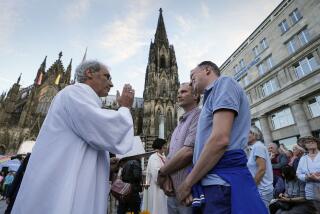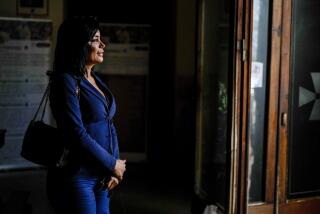In the spirit of Martin Luther, feminists send a message to the Pope
Borrowing freely from Martin Luther, the Declaration of Independence and the U. S. Constitution, three West Covina feminists delivered a message of protest to the Catholic Church and Pope John Paul II last week.
Nobody, including the Pope, seems to have gotten the message. And nobody, including the three women, seems to be bothered by that fact.
Cheerfully acknowledging the apparent futility of an act she called “difficult and daring,” Darby Mangen said, “It was important, and we believed in what we were doing.”
In the spirit of Martin Luther’s protest in 1517, Mangen, Joanne Peters and Sharon Follick, all members of the West Covina chapter of the National Organization for Women, voiced their objections to Catholic doctrines that affect women.
Just as Luther attached his 95 Theses to the door of the Castle Church in Wittenberg, Germany, the women posted five statements opposing church positions to the doors of Catholic churches in West Covina, La Puente and Rowland Heights on the day the Pope arrived in Los Angeles.
In bold letters, the NOW message began somewhat like the Constitution, saying it was from “We, the Women of the United States.”
In a variation on the Declaration of Independence, it said: “We hold these truths to be self-evident, that all men and women are created equal . . .”
The message to Pope John Paul II--and also addressed to the U. S. Conference of Catholic Bishops--was a strongly worded request that they “liberate the church from the sinful bonds of sexism.” It protested the Vatican’s opposition to abortion and artificial birth control, its condemnation of homosexual sexuality and its refusal to ordain women into the priesthood.
The message was written by California NOW, the state organization, which recommended the posting on Catholic church doors during the Pope’s visit. Mangen said, however, that the Palo Alto and West Covina chapters were the only ones to do so.
The three women are not practicing Catholics and picked the churches because of their prominence in the West Covina area.
The secretary at St. Christopher’s Church in West Covina, Betsy Dykszeul, said she removed the message from the door of the church and another that was on the rectory door. “I haven’t seen it and I think you’ll have difficulty finding anyone who has,” said Father Paul Siebenand, one of the priests at the church.
Father William Leser at St. Martha’s Church in La Puente said, “I have no idea what was in it,” because the janitor threw the message out.
Father Michael Killeen said nobody at St. Elizabeth Ann Seton Church in Rowland Heights had seen the message.
In her home a few days later, surrounded by leaflets that oppose Robert Bork’s appointment to the U. S. Supreme Court, literature about U.S. Rep. Patricia Schroeder (D-Colo.) and her possible candidacy for the presidency and several other feminist causes, Mangen speculated that the reason more NOW chapters did not participate was “because we all have so much to do.”
“It’s hard to be a working mother and a feminist,” said Mangen, mother of four grown children and a consultant for Project Self Sufficiency, a government-sponsored program to help women get off welfare. “I think everyone in NOW would have done this if they had more time and energy.”
Mangen, who converted to Catholicism in her teens but no longer practices the faith, said, “We had no intention of doing anything destructive” by posting the message. “We didn’t know what to expect. It was important to do it that day, even though we knew the priests would all be in Los Angeles for the Pope’s visit.”
Follick, a retired nurse and mother of three daughters, is not Catholic. But posting the message was appropriate, she said.
“The Pope, in declaring that women’s role is to beget children, is asserting his authority over American women, not just Catholic women. I didn’t think I was being insulting in opposing his policies,” she said.
Peters, also a convert who left the church--and also the mother of four grown children--said: “It was not an exercise in futility. Even though the Pope didn’t get the message, still it was an action. In the long run, I think it will have its effect. Most things start slowly, and then you start seeing changes.”
More to Read
Sign up for Essential California
The most important California stories and recommendations in your inbox every morning.
You may occasionally receive promotional content from the Los Angeles Times.










